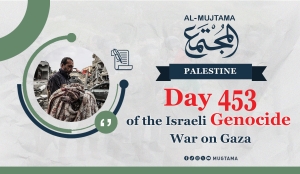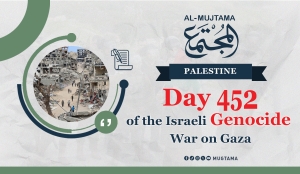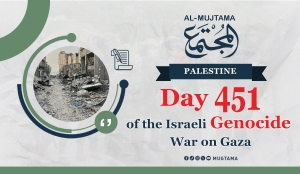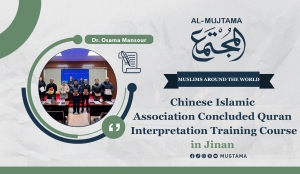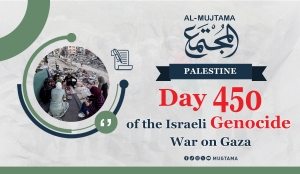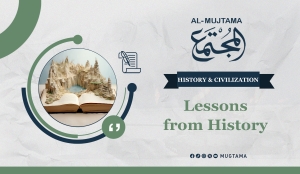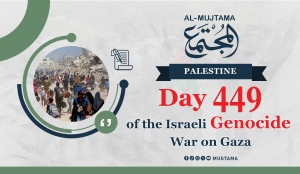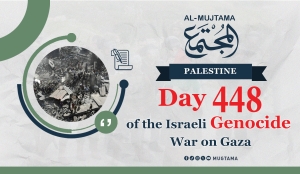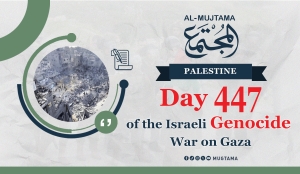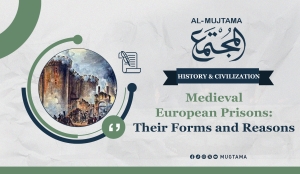Admin Mugtama
The Zionist occupation forces continue to commit the crime of genocide in the Gaza Strip for the 453rd consecutive day, through dozens of airstrikes and artillery shelling, while committing massacres against civilians amid a catastrophic humanitarian situation due to the siege and the displacement of over 95% of the population.
The Israeli army announced today that its air force carried out more than 1,400 airstrikes in December to support ground forces in Gaza.
In the West Bank, Al-Aqsa Mosque has suffered mass incursions by hundreds of settlers, amid ongoing incursions by occupation forces into various areas of the West Bank.
In the Lebanese file, Israeli violations of the ceasefire agreement continued, while Hezbollah's Secretary-General Naeem Qassem stated that the resistance has regained its strength.
Correspondents reported that occupation aircraft and artillery continued their violent airstrikes on Wednesday across various areas of the Gaza Strip, targeting homes, displacement gatherings, and streets, resulting in dozens of martyrs and injured.
The occupation forces have continued their ground invasion of large neighborhoods in Rafah since May 7 of last year, and various areas of Gaza amid heavy aerial and artillery bombardment and the commission of horrific massacres, including the destruction of homes in the Jabalia camp.
For the 89th consecutive day, northern Gaza is under Israeli siege and starvation amid heavy air and artillery bombardment, completely isolating the northern governorate from Gaza.
For the 69th consecutive day, the occupation forces have forcibly disrupted the work of civil defense in northern Gaza due to ongoing Israeli targeting and aggression, leaving thousands of citizens there without humanitarian and medical care.
Two citizens were martyred by an Israeli drone targeting a group of citizens in the Shuja'iyya neighborhood east of Gaza City.
Occupation aircraft launched airstrikes around the Kamal Adwan Hospital in northern Gaza, followed by intensive artillery shelling on the same area.
Six martyrs have been reported, including three children and two women, due to the occupation targeting a residential apartment of the Sawirki family in the Shuja'iyya neighborhood in Gaza.
The Ministry of Health reported that the Israeli occupation committed two massacres against families in the Gaza Strip, resulting in 12 martyrs and 41 injuries being received in hospitals over the past 48 hours.
It stated that several victims remain under the rubble and in the streets, and emergency and civil defense teams are unable to reach them.
The number of Israeli aggression martyrs has risen to 45,553 and 108,379 injuries since October 7, 2023.
Two citizens were martyred and others injured this morning due to an airstrike from an Israeli drone on a group of citizens in the Al-Manara neighborhood in southeastern Khan Younis.
The occupation's artillery shelled the southeastern neighborhoods of the Al-Bureij camp in the central Gaza Strip.
The occupation army demolished residential buildings in Beit Lahia town and the Jabalia camp in northern Gaza.
Eight citizens were martyred and others were injured due to the bombardment by occupation aircraft on the home of the Trous family in Jabalia town north of Gaza.
Two martyrs were reported, and others were injured due to the artillery shelling of a house belonging to the Abu Zaher family in Block 9 of the Al-Bureij camp in the central Gaza Strip.
The occupation forces bombed the home of Al Jazeera correspondent in Gaza Rami Abu Taimah in the Al-Fukhari area east of Khan Younis, injuring members of his family.
The civil defense announced that over 1,500 tents housing displaced people have been submerged in floodwaters at the displacement camps in the governorates of the Gaza Strip.
Continuous Israeli Shelling and Catastrophic Conditions Due to Rain
December 31, 2024Israeli occupation forces continue to commit acts of genocide in the Gaza Strip for the 452nd consecutive day, by launching dozens of airstrikes and artillery bombardments, while committing massacres against civilians, amidst a catastrophic humanitarian situation due to the siege and the displacement of more than 95% of the population.
Reporters stated that occupation planes and artillery continued their intense bombardment on various parts of the Gaza Strip on Monday, targeting homes, displaced persons' gatherings, and streets, resulting in dozens of martyrs and injuries.
Occupation forces continue their ground incursion into wide neighborhoods in Rafah since May 7, along several fronts in Gaza, amidst heavy air and artillery bombardment and the commission of horrific massacres, with demolition operations targeting citizen homes in the Jabalia refugee camp.
For the 88th consecutive day, northern Gaza is under Israeli siege and starvation amid severe air and artillery bombardments, with complete isolation of the northern governorate from Gaza.
For the 68th consecutive day, occupation forces are forcibly disrupting the work of the civil defense in northern Gaza due to ongoing Israeli targeting and aggression, leaving thousands of citizens there without humanitarian and medical care.
Local sources reported that occupation planes bombed a house on Al-Nuzha Street in Jabalia al-Balad, in northern Gaza.
The occupation renewed artillery shelling on the Abu Shari'a and Abdul Aal areas south of the Sabra neighborhood in southern Gaza City.
Citizen Bilal Khmeis Al-Banna was martyred due to Israeli shelling that targeted Ahmad Fikri Abu Warda Street in Jabalia al-Nazlah in northern Gaza.
Israeli tanks stationed south of the Zaytoun neighborhood fired at citizens' homes.
The government media office in Gaza announced that the number of deaths due to the severe cold in Gaza has risen to 7, confirming that the number is subject to increase.
Gaza is experiencing a thunderstorm, with heavy rain falling over the Gaza Strip, causing the flooding of dozens of displaced persons' tents in the central and southern parts of the region.
The Gaza Municipality stated that the displaced individuals are suffering from extremely tragic conditions due to the rain and storms, and there are not enough resources to assist them.
It reported that the emergency system at the sewage pumping station (7B) in the Zaytoun neighborhood, southeast of Gaza City, has been subjected to Israeli artillery fire.
It clarified that the bombardment has disrupted the emergency plan, warning of a potential health and environmental disaster, noting that the rising level of sewage water at the station and the surrounding streets creates a fertile ground for the spread of infectious diseases among the residents.
Several citizens were martyred yesterday evening, Monday, and others were injured due to Israeli shelling that targeted a gathering of Palestinians near the "Jabalia al-Balad Care Center" in northern Gaza.
The Ministry of Health reported that the occupation army committed 3 massacres in the past 24 hours, resulting in the martyrdom of 27 citizens and injuring 149 others, raising the toll of extermination to 45,541 martyrs and 108,338 injured since October 7, 2023.
Humanitarian disaster in displacement camps… “Al-Qassam” kills 5 Israeli soldiers in Jabalia
December 30, 2024
Israeli occupying forces continue to commit the crime of genocide in the Gaza Strip for the 451st consecutive day, by launching dozens of airstrikes and artillery shelling, while committing massacres against civilians amidst a catastrophic humanitarian situation due to the siege and the displacement of over 95% of the population.
Intensive bombing
Correspondents reported that the occupying aircraft and artillery continued their violent airstrikes and shelling on Monday in various parts of the Gaza Strip, targeting homes, gatherings of displaced persons, and streets, resulting in dozens of martyrs and injuries.
Ground invasion
The occupying forces continue their ground invasion of wide neighborhoods in Rafah since May 7, last, and several fronts of Gaza amidst air and artillery shelling and the commission of horrific massacres, along with the demolition of homes belonging to citizens in the Jabalia camp.
For the 87th consecutive day, northern Gaza is suffering under an Israeli siege and starvation amid intense air and artillery bombardment, with complete isolation of the northern province from Gaza.
Ongoing disruption of civil defense operations
For the 67th consecutive day, the occupying forces are forcibly disrupting the civil defense operations in areas of northern Gaza due to ongoing Israeli targeting and aggression, leaving thousands of citizens there without humanitarian and medical care.
Several citizens were martyred and others injured as a result of Israeli shelling targeting a gathering of Palestinians near the “Jabalia Town Care Center” in northern Gaza.
3 massacres in 24 hours
The health ministry reported that the occupation army committed 3 massacres within the past 24 hours, resulting in the martyrdom of 27 citizens and the injury of 149 others, raising the toll of genocide to 45,541 martyrs and 108,338 injured since October 7, 2023.
Israeli helicopters opened fire towards the northwestern areas of the city of Gaza.
Polio outbreak in Gaza
Bashar Murad, the director of Al-Quds Hospital, announced the registration of two cases exhibiting symptoms of polio in Gaza, noting that samples have been taken from them to confirm the possibility of infection with the dangerous virus.
The occupation's artillery bombarded the northwestern areas of the city of Rafah in southern Gaza.
Arresting patients
Israeli occupation forces arrested a number of patients last night while transferring them from the Indonesian Hospital in northern Gaza to Al-Shifa Hospital in Gaza City.
Medical sources indicated that the occupation forces arrested 4 patients out of 10 being transferred from the Indonesian Hospital to Al-Shifa, noting that one of the patients arrested by the occupation is in extremely critical condition.
Young man Yusuf Salem was martyred as a result of Israeli shelling targeting the Jabalia camp in northern Gaza.
The occupation forces also opened fire heavily at the last Safatawi street in the northwestern Jabalia.
Rain floods the tents
Displaced persons spent a difficult night after rainwater flooded their tents, and the winds tore apart parts of them or completely swept them away, as the tents have been deteriorating for over 15 months under Israeli genocide, while the Israeli occupation continues its raids by land, sea, and air on various areas of the Strip.
Al-Qassam: We eliminated 5 soldiers in a complex operation in Jabalia
The Al-Qassam Brigades, the military wing of the Islamic Resistance Movement (Hamas), stated that they eliminated 5 Israeli soldiers at close range in a military point of the occupation in the Jabalia camp in northern Gaza.
They added that they were able, as part of a complex operation, to invade a newly established military point for the occupation in the camp, killing the five soldiers, burning a Merkava tank and its crew, and targeting another military vehicle.
Chinese Islamic Association Concluded Quran Interpretation Training Course in Jinan
December 30, 2024
The Chinese Islamic Association in the city of Jinan, the capital of Shandong Province in eastern China, organized a two-day training course to study the book "Summary of the Interpretation of the Holy Quran," presented by Ma Zhonggang. The course was attended by 80 imams from the province, and Ma Wuyue, the director of the translation office of the Chinese Islamic Association, was invited to give lectures about the book, explaining some excerpts and notes on it. Jin Shulong, the deputy president of the Islamic Association at both the provincial and municipal levels, participated, along with the responsible comrade managing religious affairs at the Office of Civil and Religious Affairs, who delivered a welcoming speech to the attendees.
History of Chinese Translation of the Quran
During the training, Yue reviewed the history of the Chinese translation of the Quran in China, which has spanned nearly two hundred years, during which many Muslim scholars contributed significantly, producing many achievements in translating the words of the Holy Quran and famous interpretations, such as those of Ibn Kathir, Al-Tabari, Al-Jalalayn, and others.
Principles and Objectives of the Translation
He also pointed out the principles, standards, and objectives of the translation work currently being carried out, using a large number of examples to illustrate the importance of the book "Summary of the Interpretation of the Holy Quran" in terms of its preparation and the style of translating excerpts and brief explanations of the noble Quranic verses. He emphasized the necessity of benefiting from the ideas highlighted in the book regarding the importance of studying the Quran and utilizing its clarifications and interpretations in daily life, adhering to Islamic values and ethics, and attempting to connect them with original Chinese culture in a way that does not contradict Islamic traditions.
Suggestions from Trainers
Integration into Sermons and Guidance
The trainers suggested that the Jinan Islamic Association organize, study, and effectively utilize the explanations, excerpts, and notes presented in the book, integrating them into sermons and guidance in mosques. They also recommended incorporating the content of the new translation into communication processes between Chinese Muslims and others, as well as integrating it into daily teaching activities to guide imams in effectively using the new translation. Additionally, they aimed to merge Islamic concepts to promote peace, justice, and tolerance in the daily lives of Chinese Muslims and systematically enhance the Chinese characteristics of Islam in the city of Jinan.
Discussions and Agreement
During the training course, discussions were held on how to benefit from the book "Summary of the Interpretation of the Holy Quran" and fully allow its effective role in guidance, preaching, interpretation, and academic research. The participants agreed that the book represents an important achievement in Islamic scholarly circles, and the publication and distribution of this book will undoubtedly deepen and solidify the localization of Islam in China.
Enhancing Training of Religious Leaders
The meeting participants suggested enhancing the training of religious leaders to help them accurately understand and comprehend the content of the "Summary of the Interpretation of the Holy Quran," and emphasized the necessity of utilizing it as an educational material specifically for Islamic schools. In addition, they recommended integrating interpretation and lectures into religious curricula to guide the majority of Islamic circles and the public toward a clear understanding of religious beliefs and laws, and to implement them correctly. It is essential to deepen the study of the Holy Quran and focus on major theoretical and practical issues such as fundamental teachings, doctrinal concepts, religious rules and rulings, ethics and customs, and transactions, while promoting a healthy climate for Islam in our country.
Importance of the Book
Simplified Explanation and Interpretation
The importance of the book "Summary of the Interpretation of the Holy Quran" lies in its easy and accessible interpretation, which relies on a simplified explanation of the verses of the Holy Quran, through the sayings of the Prophet Muhammad (peace be upon him) alongside the verses of the Quran. It adopts an explanation of the Quran using both the Quran itself and the noble Hadith, placing the explanations alongside the verses on the same page, relying on simple and easy-to-understand words derived from Chinese culture. The author sought to avoid using uncommon words that might be difficult for readers to understand and concluded the interpretation of each verse with an explanation of its general idea.
Visual Aids for Better Understanding
Additionally, the author took care to use square brackets and colored symbols for some important words and terms to attract the attention of the reader and distinguish them among the lines; this makes it easier for the Chinese Muslim community to understand the text with ease.
About the Author
Ma Zhonggang
As for the author of the book, Ma Zhonggang, he obtained his college diploma in English in 1981. In 1982, he was appointed as a teacher at the Chinese Islamic Institute for Islamic Studies in Kunming, the capital of Yunnan Province in southwestern China, and he currently serves as the vice president of the institute. He has studied the Quran and Hadith for many years, and his work on the book "Summary of the Quran Interpretation" took more than 10 years, starting in 1990 until its final form in early 2004. It was published by the Religious Culture House for the first time in 2005 and was re-published again in 2022. The book consists of 670 pages.
On the 450th day... the occupation continues its "genocidal" war on the Gaza Strip
December 29, 2024Israeli aircraft continue to bombard various areas of the Gaza Strip on the 450th day of the war, resulting in a large number of martyrs and wounded.
The Israeli occupation committed two massacres in the past 24 hours against families in the Gaza Strip, resulting in 48 martyrs and 52 injured.
The toll of the Israeli aggression has risen to 45,485 martyrs and 108,090 injuries since October 7, 2023.
Gaza and the North
The occupation army announced the end of its military operation at Kamal Adwan Hospital and its surroundings, detaining 240 citizens, while the health ministry in Gaza announced the arrest of ten of its staff, including the hospital director, Dr. Hossam Abu Sufiya.
The occupation army forced 17 patients and injured persons to transfer to the Indonesian Hospital with their companions, without the presence of electricity or medical treatment.
The occupation army began evacuating the town of Beit Hanoun and arresting several displaced persons there, coinciding with airstrikes that resulted in the martyrdom of ten citizens from the Al-Zaanin family.
In Gaza, three citizens were martyred as a result of the occupation's warplanes bombing a house in the Al-Nafaq area in the middle of Gaza City.
The director of the beach camp police was martyred in a shelling on Al-Jalaa Street in Gaza City, in addition to the martyrdom of young man Jihad Ashraf Abu Diya in the shelling of the Sabra neighborhood in the south of Gaza City.
The occupation army is carrying out demolition operations in the southern areas of the Al-Zeitoun neighborhood in southeastern Gaza City, coinciding with heavy gunfire.
South of the Strip
A man and his wife were martyred in an Israeli bombardment that targeted a house belonging to the Muharib family in the Al-Nasr neighborhood, north of the city of Rafah in southern Gaza.
The martyr is Tamer Muharib and his wife Nisreen Muharib.
Artillery from warboats bombarded the Al-Mawasi area west of Rafah.
Occupation aircraft bombed a house in the large Abasan area east of Khan Younis, causing a fire to erupt inside it without any injuries.
Five citizens were injured in the shelling of a house belonging to the Al-Naffar family in Qizan al-Najar, south of Khan Younis, while two citizens were martyred in the bombing of a displacement tent west of the city.
Central Gaza Strip
Several citizens were injured as a result of the occupation's bombardment of a house in the Al-Sawartha area west of the Al-Nuseirat camp in the central Gaza Strip.
The Israeli artillery continued its bombardment of the northern part of the Al-Nuseirat camp.
Lessons from History
December 29, 2024
Before the Battle of Qadisiyyah (15 AH), the commander Rustam sent a message to Sa’d bin Abi Waqqas (may Allah be pleased with him) saying: "Send us a man." So, Sa’d sent Al-Mughira ibn Shu'ba (may Allah be pleased with him). When he arrived at the Persian headquarters, they detained him before finally allowing him in, after exaggerating their attire to diminish the Muslims. Al-Mughira found their leaders wearing crowns and gold-woven garments. Rustam addressed him: "Speak, or shall I speak?" Al-Mughira replied: "You sent for us, so speak."
Rustam praised his people, glorified their status, and went on for a while, saying: “We have always been in control of the land, dominating over our enemies, esteemed among nations. No king has the honor, prestige, and authority we possess. We are victorious over people except for a day or two, or a month or two, due to sins. When Allah takes revenge and is pleased, He restores our honor, gathering us against our enemies for the worst day to come upon them.” Rustam then belittled the Arabs and Muslims, saying: “I do not desire to kill or capture you.”
Al-Mughira's Response
Al-Mughira praised Allah and said: “Allah is the creator and provider of everything. What you mentioned about your people, their dominance over enemies, and their control over the land and great authority in the world, we know and do not deny. Allah granted it to you and placed it within you, but it belongs to Him, not you. As for the poor condition you mentioned about us, and the tight livelihood and differing hearts, we know it and do not deny it. Allah tested us with it, and the world revolves.”
He concluded: “If you need us to protect you, then be our servant, paying the jizya (tax) in submission. Otherwise, the sword if you refuse!”
Rustam became extremely angry, swearing not to let the morning come without killing all the Muslims. He tried to weaken Al-Mughira by sending a man to accompany him back to the Muslim camp, shouting: “The king, being an astrologer, calculated and looked into your matter, saying: ‘Tomorrow your eye will be gouged out.’”
Al-Mughira replied: “You have given me good news and reward. If it were not for the need to fight people like you after today, I would wish the other eye were taken as well.” The Muslims laughed at Al-Mughira’s quick wit and sharp insight. The Persian returned to Rustam, saying: “Obey me, O Persians, for I see Allah’s punishment upon you that you cannot avert.”
Reflecting on Qadisiyyah
This scene from the Battle of Qadisiyyah is brought to us by history, to reflect upon and draw lessons. Therefore, here are some reflections:
- Sins Prevail
Every day, we witness violations of honor, theft of wealth, bloodshed, destruction of homes, and desecration of holy places and prayers! Muslims today complain of oppression, injustice, enslavement, tyranny, loss, and humiliation. The reason is the overwhelming stench of sins within the Ummah. The consequence is stated in Allah's words: “And Allah presents an example: A city which was safe and secure, its provision coming to it in abundance from every location, but it denied the favors of Allah. So Allah made it taste the envelopment of hunger and fear for what they had been doing.” (Quran, An-Nahl: 112)
In a similar situation, a man wrote to a pious person complaining about the tyranny of the workers. He responded: “O my brother! Your letter has reached me, mentioning the tyranny of the workers. It is not appropriate for those who engage in sin to deny punishment. I think what you are experiencing is due to the evil of sins. Peace be upon you.”
- The World Revolves
Al-Mughira ibn Shu'ba understood long ago that days rotate, never remaining constant for anyone. Tomorrow, the oppressor and the oppressed, the jailer and the prisoner will all pass away. “Every oppressor among the people has his day of retribution.” Ibn Al-Jawzi said: “Know that time does not remain constant, as Allah Almighty said: ‘And those days We alternate among the people.’ (Quran, Al-Imran: 140) Sometimes poverty, sometimes wealth, sometimes honor, and sometimes humiliation. The happy one is he who adheres to one principle in all circumstances, which is piety to Allah Almighty.”
- The Sword if You Refuse!
It is evident that those upholding the banner of truth and associating with it are either martyrs who have been treacherously killed, detainees hidden behind four walls for speaking the truth, fighters in the fields awaiting death at any moment, fugitives constantly moving, or strangers among their people awaiting a moment to confront their oppressors. Meanwhile, others are either stubbornly denying the truth or ignorant followers of every misleading voice.
History has taught us that if falsehood has overwhelming power, then truth must have power to support and protect it. Falsehood relentlessly pursues believers, resisting and causing harm and torment. So why should the people of truth hesitate to stand firm against falsehood and its supporters, while hoping from Allah what the oppressors do not hope for and will never hope for?
- Good News and Reward
Look at Al-Mughira (may Allah be pleased with him)! See how he embraces the loss of his eye! It is an honor from Allah in His way! It is good news and a promise of reward. He even wishes that Allah would honor him with losing the other eye in His way. This is the spirit that should reside in those striving in His cause.
“Those who have believed, emigrated, and striven in the cause of Allah with their wealth and their lives are greater in rank in the sight of Allah. And it is those who are the attainers [of success]. Their Lord gives them good tidings of mercy from Him and approval and of gardens for them wherein is enduring pleasure. [They will be] abiding therein forever. Indeed, Allah has with Him a great reward.” (Quran, At-Tawbah: 20-22)
The love of jihad possessed Al-Mughira, so he sought safety to continue fighting from every angle. He asked Allah for the safety of his other eye to fulfill his role in the struggle between truth and falsehood. Sa'id ibn Al-Musayyib learned and practiced this lesson, once going out to fight with one eye, being told he was ill and had an excuse. He responded: “Allah mobilizes the light and the heavy. If I am unable to fight, I will increase the numbers and protect the supplies.”
Even if he lost both eyes, he would not cease to be among the fighters. Abdullah ibn Umm Maktum (may Allah be pleased with him) was blind and exempted in the verse “other than those with a disability” (Quran, An-Nisa: 95). Yet, he continued to fight, saying: “Hand me the banner; I am blind and cannot flee. Place me between the ranks.” He attended Qadisiyyah with the Muslims’ banner, wearing a full protective armor.
The True Fighter
The sincere fighter accepts no excuses, bends for no hindrance, conquers obstacles, breaks chains, and seeks a breach to fulfill his duty to Allah.
As the 449th day of the "Al-Aqsa Flood" operation begins, the occupying forces continue to escalate their aggression against the Gaza Strip, leaving behind massacres against civilians, amidst ongoing clashes between the Palestinian resistance and the occupation forces on multiple fronts.
UNRWA Commissioner: Children in Gaza are freezing to death
Amid the harsh conditions faced by the people of Gaza, Philippe Lazzarini, the Commissioner-General of the United Nations Relief and Works Agency for Palestine Refugees in the Near East (UNRWA), warned of the severe suffering that Gaza's children face due to the extreme cold and lack of shelter.
In a press statement, Lazzarini pointed out that children in Gaza are freezing to death due to the lack of blankets and winter supplies, which have been stuck at the occupation's crossings for months, awaiting "Israeli" approval for their entry into the region.
He emphasized that there is an urgent need for an "immediate ceasefire" and the flow of essential supplies to relieve the population, especially in light of the harsh winter that is hitting the sector.
Gaza Government: 81% of displaced persons are living in a tragic crisis due to severe cold
The Government Media Office in Gaza reported that 81% of the displaced persons in the sector are living in tragic conditions threatening their lives due to the collapse of tents and waves of severe cold sweeping through Gaza.
The office mentioned in a statement that around two million displaced persons have been forced to live in tents made of worn-out fabric, suffering daily from the harsh cold and health risks.
In recent days, these conditions have resulted in the death of five individuals due to the cold waves, while about 110,000 tents out of a total of 135,000 have been confiscated and completely destroyed due to severe weather fluctuations.
Reports also indicate that this situation exacerbates the humanitarian crisis in Gaza and threatens the lives of more displaced families.
Several medical staff martyred at Kamal Aldaouan Hospital
In a new Zionist crime, Palestinian medical sources reported that a number of medical staff at Kamal Aldaouan Hospital in northern Gaza were martyred as a result of fires set by the occupying forces in the hospital, due to the flames spreading to large sections of it, according to the "Al-Jazeera Net" site.
According to the sources, the occupying forces, after besieging the hospital, stormed it and ordered the evacuation of the medical staff and patients while heavy artillery shelling by the occupation intensified around the hospital.
The hospital was receiving many emergency medical cases, including those injured in the ongoing battles.
Occupation detains director of Kamal Aldaouan Hospital
The Palestinian Ministry of Health in Gaza announced the detention of Dr. Hossam Abu Safia, the director of Kamal Aldaouan Hospital, by the occupying forces after storming the hospital and forcing the medical staff to evacuate the premises.
In the ministry's statement, it was confirmed that the patients evacuated from the hospital were forcibly transferred to the Indonesian hospital, where they faced tragic conditions due to a lack of essential services, including electricity, water, and food supplies.
The ministry warned that the health situation at the Indonesian hospital is rapidly deteriorating, as patients face the risk of death due to the lack of basic medical care. The hospital's infrastructure was previously destroyed by the occupying forces, which increases the difficulty of providing services to the injured and affected.
"Hamas" denies the occupation's claims regarding Kamal Adwan Hospital
The Hamas movement firmly denied any military presence or the presence of resistance fighters at Kamal Adwan Hospital, affirming that the hospital has always been open to all patients and international organizations that were inspecting the situation there. The movement considered that the claims promoted by the occupying forces are mere excuses to justify the heinous crime committed by the occupying forces against the hospital, including evacuations and burning of various departments.
The movement confirmed that these lies are not new, as the occupation has previously used the same method to justify the destruction of other hospitals in Gaza, such as Al-Shifa Hospital. They called on the United Nations and the international community to condemn these crimes and to work on forming an international commission of inquiry to hold the occupation accountable for its actions.
“Al-Qassam”: Attack on a military point and sniping of an Israeli soldier in Jabalia
In a related context, Al-Qassam Brigades, the military wing of Hamas, announced that its fighters managed to sniper an Israeli soldier in the Studio Sultan area east of Jabalia in the northern Gaza Strip. This operation is part of a series of operations carried out by Palestinian resistance against the occupying forces throughout the Gaza Strip, in a time when the area is experiencing unprecedented Israeli aggression since October 7, 2023.
The brigades also announced the storming of an Israeli military post, resulting in casualties among the soldiers during a clash in the Abu Safiya area east of the Jabalia camp.
Withdrawal of the Israeli "Nahal" Brigade from Rafah
The occupying army announced today, Saturday, the withdrawal of the "Nahal" Brigade from the Rafah area after the deaths of 50 of its officers and soldiers during the aggression on Gaza. The army clarified in a statement that the combat team of the "Nahal" Brigade completed its mission in Rafah last week after seven months of fighting, and responsibility was transferred to the combat team of the "Kiryati" Brigade (4), according to what the Anadolu Agency reported.
Occupation: Detection of rocket launches from Gaza towards occupied Jerusalem
The occupying forces announced on Saturday evening that they had detected the launch of two rockets from northern Gaza towards the occupied city of Jerusalem, where explosions were heard in the area. The occupying army reported that sirens sounded in the city, later revealing that the rockets had been launched from the Gaza Strip towards Jerusalem.
Day 448 of the Israeli Genocide War on Gaza
December 27, 2024Today marks the 448th day of the war on Gaza… The occupation continues to commit massacres, resulting in a large number of martyrs and injuries.
Israeli planes continued to bomb various areas of the Gaza Strip on the 448th day of the war, leaving behind a significant number of martyrs and injuries. The Israeli occupation has perpetrated three massacres within the past 24 hours against families in the Gaza Strip, resulting in 38 martyrs and 137 injuries. The death toll from the Israeli aggression has risen to 45,399 martyrs and 107,940 injuries since October 7, 2023.
Gaza and the North
On Friday morning, occupation forces surrounded Kamal Adwan Hospital in Beit Lahiya and gave the hospital director several minutes to gather the injured and staff in the hospital courtyard before cutting off communication. Five hospital workers, including a doctor and two paramedics, were martyred in a series of bombings. The director of Al-Awda Hospital, Mohamed Salha, and six members of the medical staff were also injured, and there was considerable damage to the facilities and sections due to the explosion of several booby-trapped "robots" by the occupation forces around the hospital.
In Gaza, three citizens were martyred as a result of airstrikes on the Hararah family's home near Al-Istijabah Mosque in the Al-Sabra neighborhood, south of Gaza City. Four martyrs and several injuries resulted from Israeli bombing of the Abu Baid family home in the Shujaiya neighborhood, east of Gaza City. The occupation planes also bombed a house in the Sheikh Radwan neighborhood of Gaza City, resulting in the martyrdom of thirteen citizens from the Htahat family and also a house belonging to the Salim family in the Al-Sabra neighborhood, where two martyrs and several injuries occurred.
Central Gaza
The occupation army renewed its artillery shelling on the north of Al-Nusairat Camp. A Palestinian fisherman was martyred by Israeli navy fire in the northwest of the camp.
South of the Gaza Strip
Violent explosions were heard resulting from the occupation blowing up houses in Rafah city in the southern Gaza Strip. Citizen Mena Abdul Karim Ashour succumbed to her injuries sustained several days ago when their home in the Al-Nasr neighborhood east of Rafah was targeted. Israeli artillery continued its bombardment of eastern Khan Younis. Four citizens were martyred in the bombing of the Civil Defense headquarters in the Al-Tuffah neighborhood, one of whom was a worker and his only son.
Last night, nine were martyred as a result of an Israeli bombing that targeted a house in Jabalia Al-Nazla in northern Gaza, including a man, his wife, and their five children. Additionally, three citizens were martyred as a result of bombing a house in Beit Hanoun town in northern Gaza.
With the entry into the 447th day of the "Al-Aqsa Flood" operation, the occupation forces continue to escalate their aggression against the Gaza Strip, leaving behind massacres against civilians amid ongoing clashes between the Palestinian resistance and occupation forces on several fronts.
Three Newborns Die in Gaza Due to the Cold
Three newborns in the Gaza Strip died this morning, Thursday, due to the severe cold and low temperatures.
According to medical sources, the ages of the victims ranged between 4 and 21 days, and their health conditions worsened due to food insecurity among their mothers, leading to an increase in diseases among newborns.
Five Journalists Martyred in Bombing at Nussairat Camp
In another crime targeting free media, five journalists from "Al-Quds Today" channel were martyred as a result of the occupation forces bombing a television broadcasting vehicle near Al-Awda Hospital in Nussairat Camp in the central Gaza Strip.
With this, the number of journalists martyred since the beginning of the aggression has risen to 201, according to the government media office in Gaza.
Government Media Office in Gaza: Explosive Robots Targeting Civilians
The government media office in Gaza announced that the occupation is using robots carrying explosives to target civilians and infrastructure, in a dangerous escalation that represents a blatant violation of international humanitarian law.
The office confirmed in a statement today, Thursday, that these innovative methods of killing and extermination reflect the occupation’s insistence on destroying infrastructure and killing innocents.
The office called on the international community and the International Criminal Court to bear their legal responsibilities in holding the occupation leaders accountable for these crimes and urged human rights organizations to document these violations and work on bringing the perpetrators to justice.
"Al-Qassam" Targets Zionist Forces in Al-Zeitoun and Jabalia
Al-Qassam Brigades, the military wing of the Islamic Resistance Movement (Hamas), announced the execution of a qualitative operation in Al-Zeitoun neighborhood south of Gaza, where its fighters engaged with a walking Zionist force from zero distance, resulting in deaths and injuries among the forces.
"The brigades targeted a 'Merkava' tank with an explosive device near Ali Mosque in the southern neighborhood of Al-Zeitoun in Gaza City.
The 'Qassam' announced that their fighters managed to target a Zionist foot patrol consisting of 7 soldiers with a powerful explosive device, indicating that they caused casualties among killed and wounded in the Jabalia refugee camp in the northern sector.
The brigades also targeted a Zionist engineering unit with a 'TBG' shell while it was advancing to demolish several homes west of Jabalia refugee camp in the northern sector.
The occupation army radio reported: A Zionist officer was killed by sniper fire in 'Netzarim.'
The radio stated that the officer, holding the rank of Major, was killed by Palestinian sniper fire in the 'Netzarim' area in the middle of the sector.
Former head of the 'Mossad': Military pressure has failed to return the captives; the solution lies in a prisoner exchange deal.
Former head of the 'Mossad' Danny Yatom stated that the continued military pressure on Gaza has not contributed to the return of the captives, stressing the necessity of reaching a prisoner exchange deal instead of military stubbornness, according to what was reported by 'Al Jazeera.net'.
He added: 'We realized more than a year ago that military pressure on Hamas has not yielded significant results regarding the return of the kidnapped.' He continued: 'We should seek to reach a prisoner exchange deal that guarantees their release and a withdrawal from Gaza, while keeping the option of returning to it whenever necessary.'
The newspaper 'Haaretz': Ending the war is essential for recovering the captives.
In its editorial, the Hebrew newspaper 'Haaretz' called for an end to the war on Gaza and a withdrawal from the sector in exchange for the return of the captives.
It noted that Prime Minister Benjamin Netanyahu refuses this out of fear of his far-right government coalition collapsing at the hands of his right-wing partners.
The newspaper confirmed, according to what was reported by 'Anadolu', that the continuation of the war will not bring back the captives, stating that 'we should also not wait for Trump to complete the deal with Hamas.'"
Medieval European Prisons: Their Forms and Reasons
December 26, 2024
Those who have read "Les Misérables," one of the most detailed historical novels written by Victor Hugo, will understand its portrayal of 19th-century France. The novel explores deep social issues such as poverty, justice, mercy, and faith. The story revolves around Jean Valjean, a Frenchman imprisoned for stealing a loaf of bread to feed his starving family. Upon his release, he finds it difficult to reintegrate into society due to the stigma that follows him. He faces numerous hardships, oppression, and injustice.
Historical Context
The importance of this novel (and its artistic representation) lies in its realistic depiction of the pre-French Revolution era, highlighting social and economic life and the issue of missing justice. Despite the potential exaggeration in the literary text, the documented history of Europe in major historical references like "The Story of Civilization" by historian Will Durant confirms that the corruption in medieval European life was far greater than depicted in "Les Misérables." At that time, the majority in Europe had fewer rights than animals.
Nature of Prisons and Types of Punishment in the Middle Ages
Medieval prisons differed greatly from today's institutions. They were not designed for rehabilitation but served as temporary holding places before severe punishments were carried out or for detaining debtors, the insane, or slaves. These prisons were often stone towers or cellars within castles, fortresses, monasteries, and churches, and were not specifically designed for detention. Conditions were extremely harsh, dark, damp, crowded, and lacked hygiene. Prisoners faced diseases and epidemics, had minimal and unhealthy meals, and there was no separation of genders or types of crimes, leading to a mix of men, women, and children in the same place.
Corruption and Harsh Punishments
There were no fixed laws regulating the relationship between jailers and prisoners, and bribery played a significant role in the entire process. Bribery could be used to buy off the guards by prisoners or their families. Punishments during that time were extremely harsh for deterrence rather than reform. The punishment for stealing a loaf of bread could be several years of imprisonment, with a lifelong stigma and persecution, despite the harsh economic conditions forcing many to endure hunger for days.
Religious and Political Influence on Punishments
The Catholic Church played a major role in the severity of punishments, especially against those who disagreed with its scientific beliefs, like Galileo, who discovered that the sun, not the earth, is the center of the universe. The church believed the earth was the center of the universe. Despite historical doubts about Galileo being burned by the church, the church officially apologized in 1992 for its judgment against him. Life imprisonment was rare and usually led to execution.
Notable Severe Punishments
Among the harsh punishments for minor crimes was "enslavement," where a criminal could be sentenced to lifelong servitude. Exile to a distant place was a common punishment for some political crimes, and criminals were publicly shamed through flogging in public squares.
Reasons for Harsh Punishments
Life in the Middle Ages was inherently harsh, and prisons and punishment were just manifestations of that harshness. With the absence of a developed judicial system, convictions often relied on confessions obtained under torture or unreliable testimonies. The dominant church viewed class differences between people naturally, as if the rich and noble classes had the right to enslave others merely for being poor or propertyless.
Religious Perspective on Punishment
Punishment was seen as atonement for sins, with deterrence as the main goal to prevent others from committing crimes, believing that harsh punishment was the best way to achieve this in feudal societies. Harsh judgments were also believed to subdue political opponents and rebels and punish rebellious peasants who refused the orders of feudal lords, regardless of the simplicity or value of the stolen items. Religious punishments, which were more akin to vengeance than punishment, were among the harshest and were directed at those with beliefs contrary to Christian teachings.
Inquisition Courts: An Unforgivable Human Fall
The idea of establishing "Inquisition Courts" began in the 13th century when the Catholic Church was given free rein to control everything, and punishment was imposed based on people's intentions and thoughts. The Pope of Rome tasked bishops with acting as informers to investigate people's thoughts and whispers, accusing any dissident of heresy, and then punishing them with death or brutal torture.
Torture Techniques
In Andalusia, history recorded the most atrocious acts against humanity, where King Ferdinand of Aragon and Queen Isabella of Castile excelled in torturing those who did not convert to Christianity or secretly maintained their faith. Pope Sixtus IV issued a decree in November 1478, authorizing them to appoint six priests to form an Inquisition Court to investigate and punish heresy charges. The court targeted converted Jews and Muslims suspected of reverting to their old faiths and encouraged everyone to act as witnesses to inform on their neighbors, friends, and relatives.
Modern Reflections
The church's apology in 1992 for Galileo's judgment highlights the historical wrongs committed in the name of faith. The Inquisition, and the brutal torture methods it employed, represent a historical human fall that cannot be forgiven, especially against Muslims or those opposed to Catholic Christianity.
---------------------------------------------
Sources
- Will Durant: An American philosopher, historian, and writer, born on November 5, 1885, in North Adams, Massachusetts, USA. He is best known for his work "The Story of Civilization," co-authored with his wife, Ariel Durant.
- "The Story of Civilization" by Will Durant: Adapted from this major historical reference.
- Galileo Galilei: An Italian astronomer, philosopher, and physicist born in Pisa, Italy. Sometimes described as a polymath, he published and strongly defended the heliocentric theory proposed by Copernicus. Galileo first disproved Aristotle's theory of motion through observation and experimentation. (Wikipedia, born on February 15, 1564).
- The Historical Encyclopedia, adapted from the Umayyad era (Islamic History): Taken from the news of the people of Andalusia by Hayyan ibn Khalaf al-Qurtubi.
- Previous Source: Additional information from the same historical encyclopedia.

